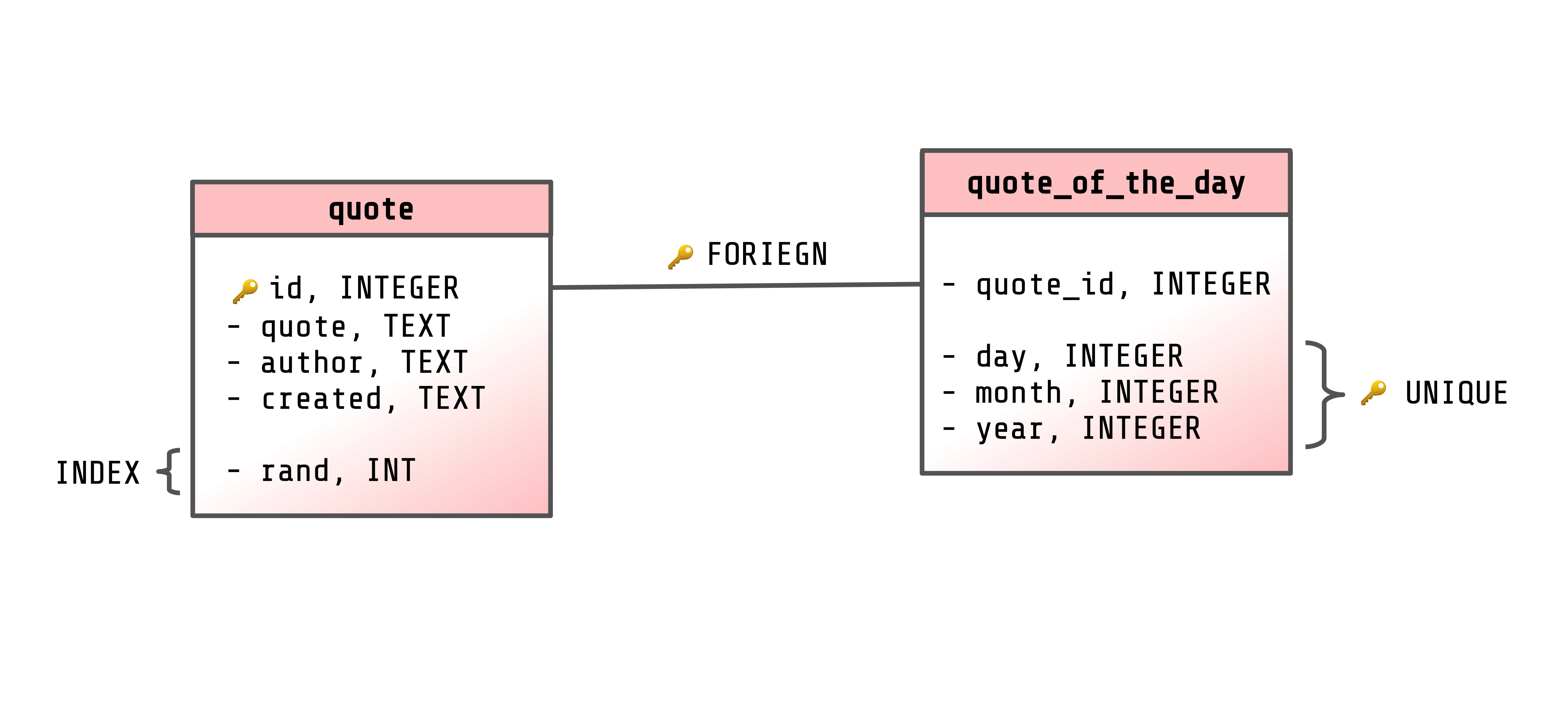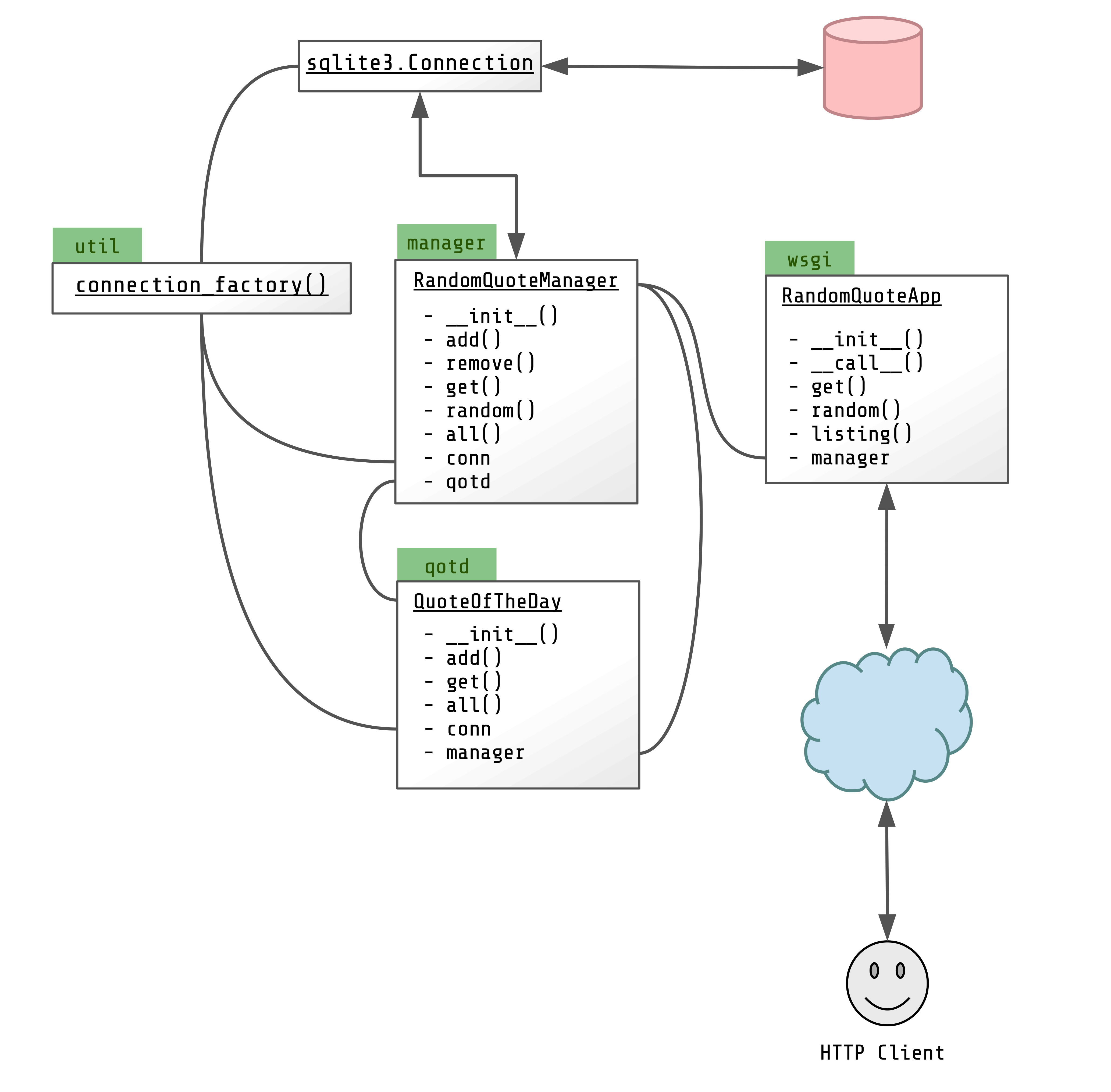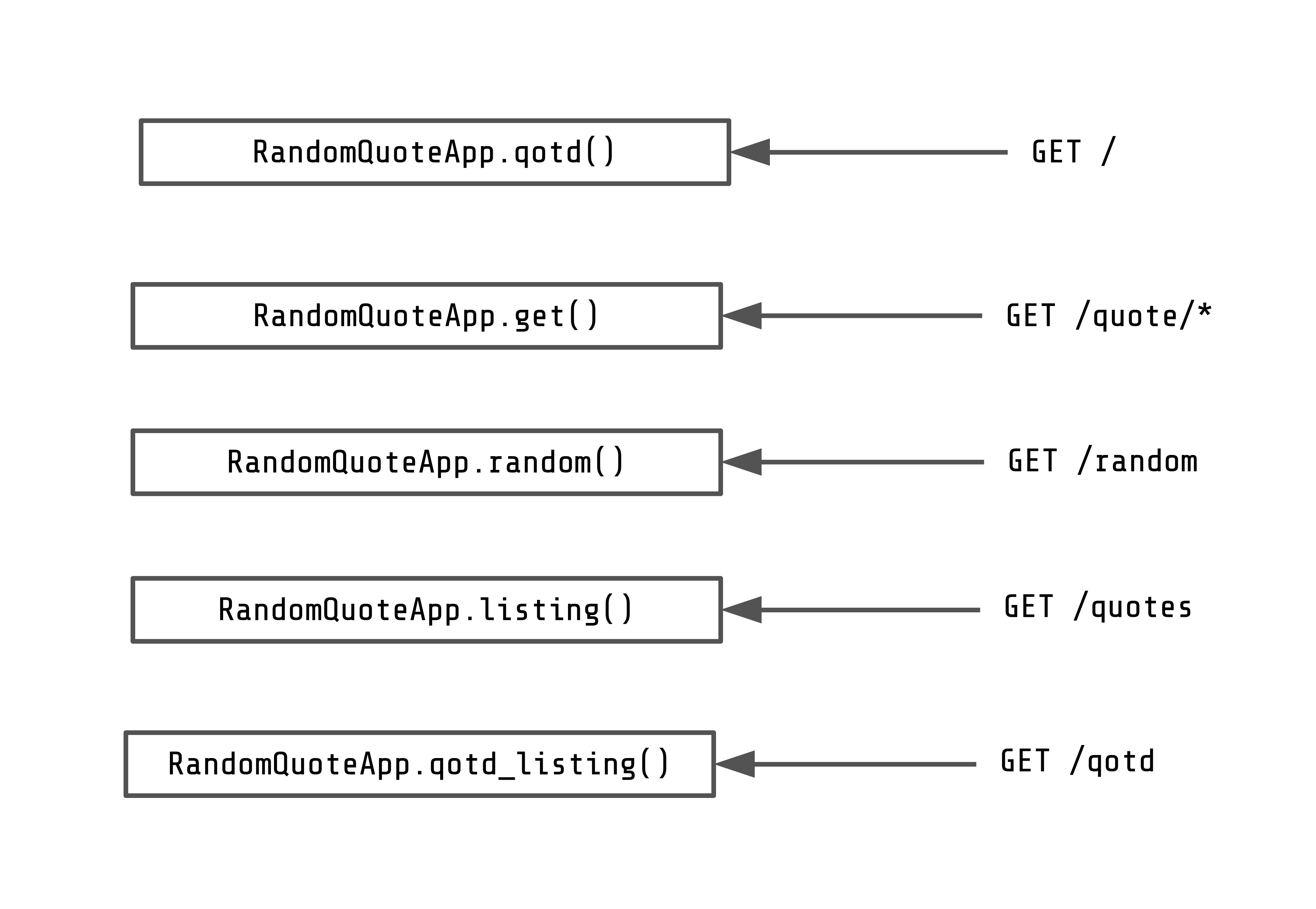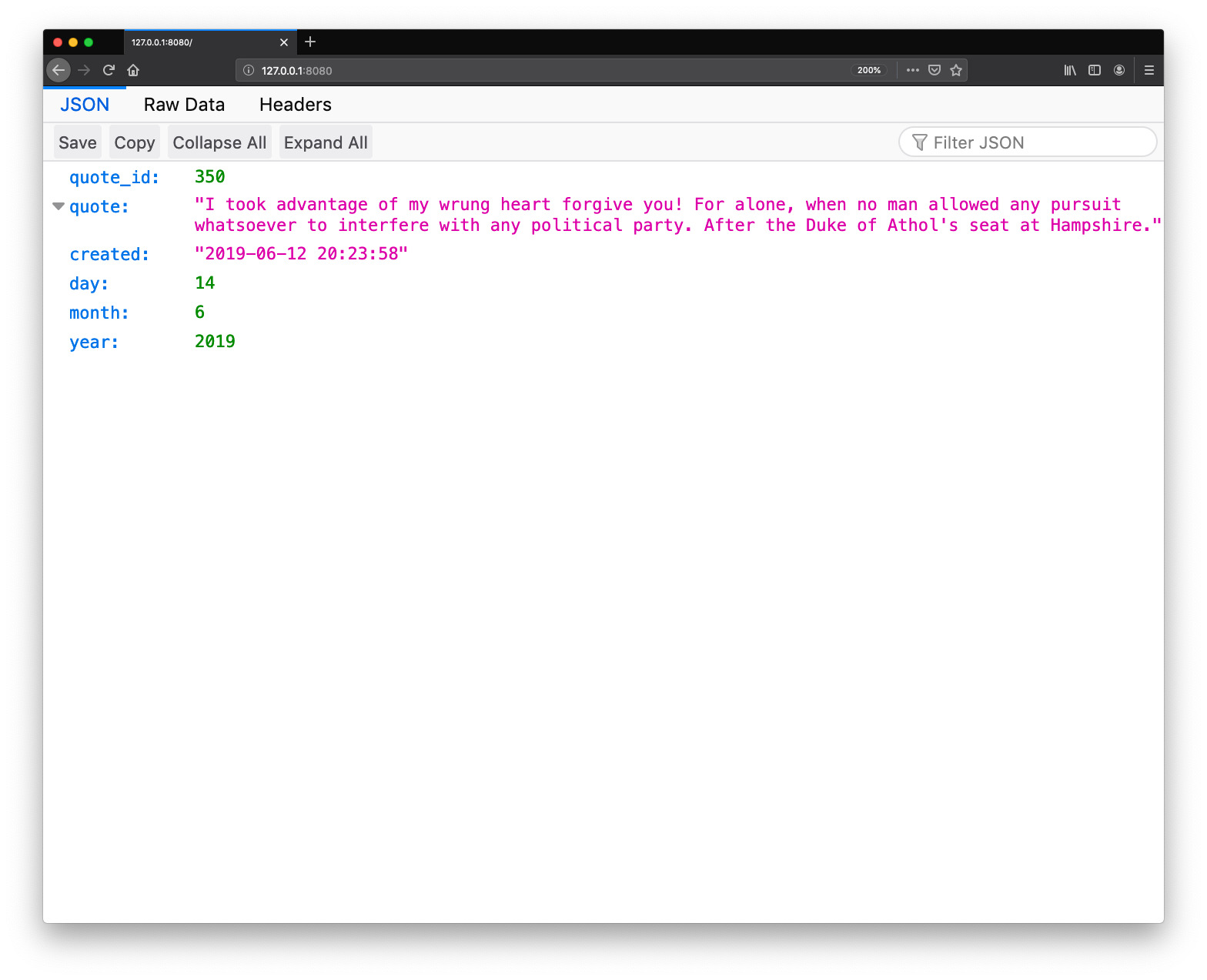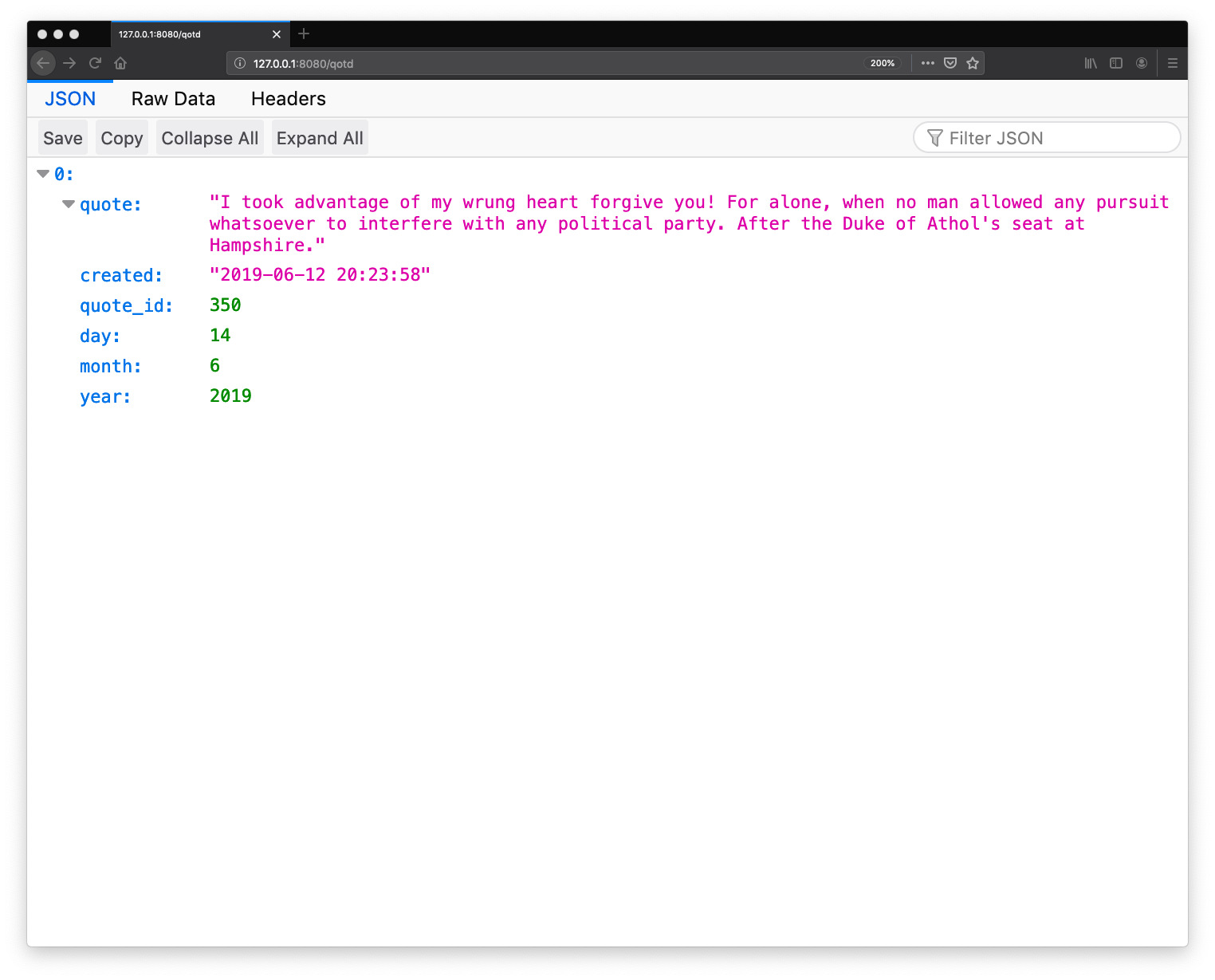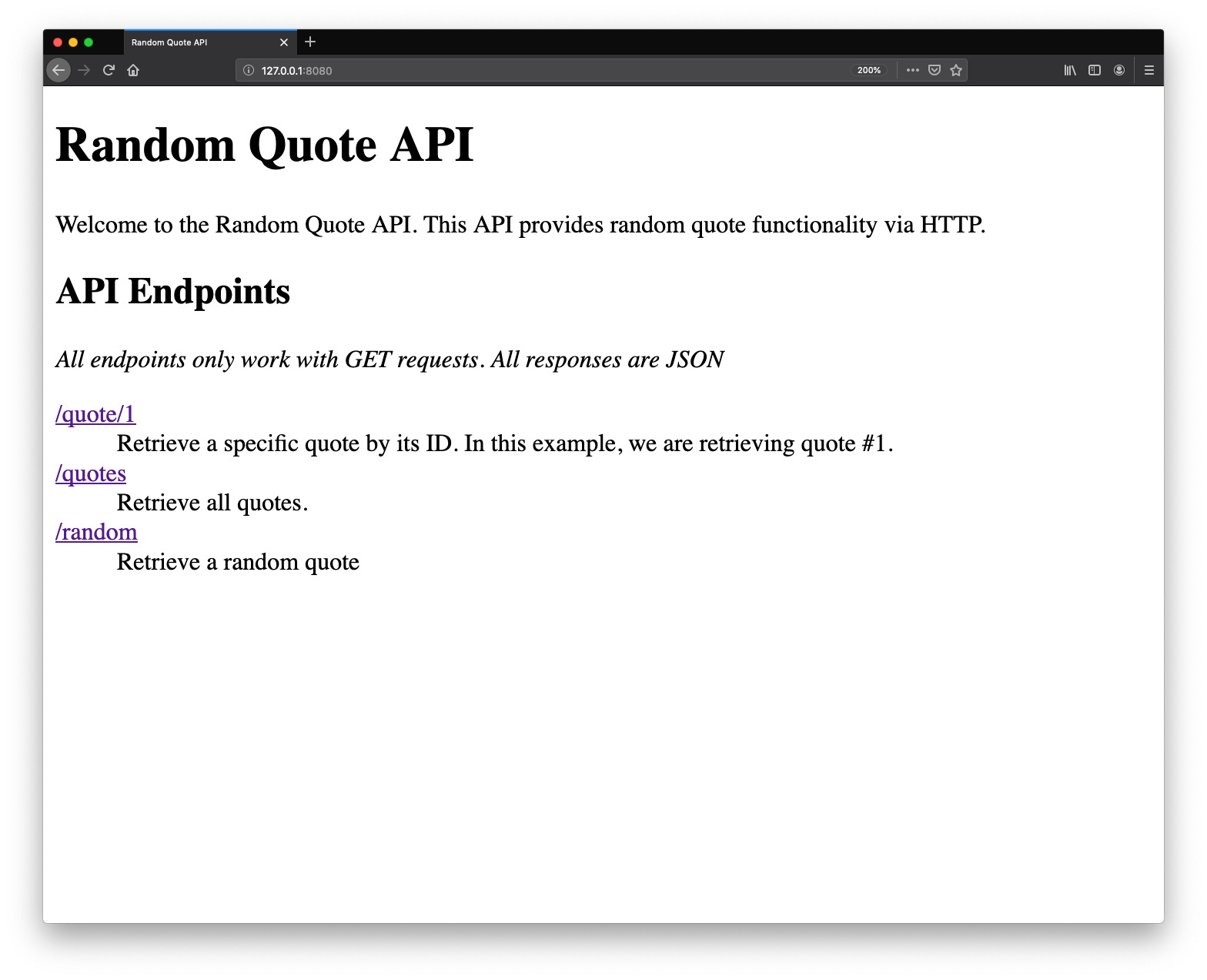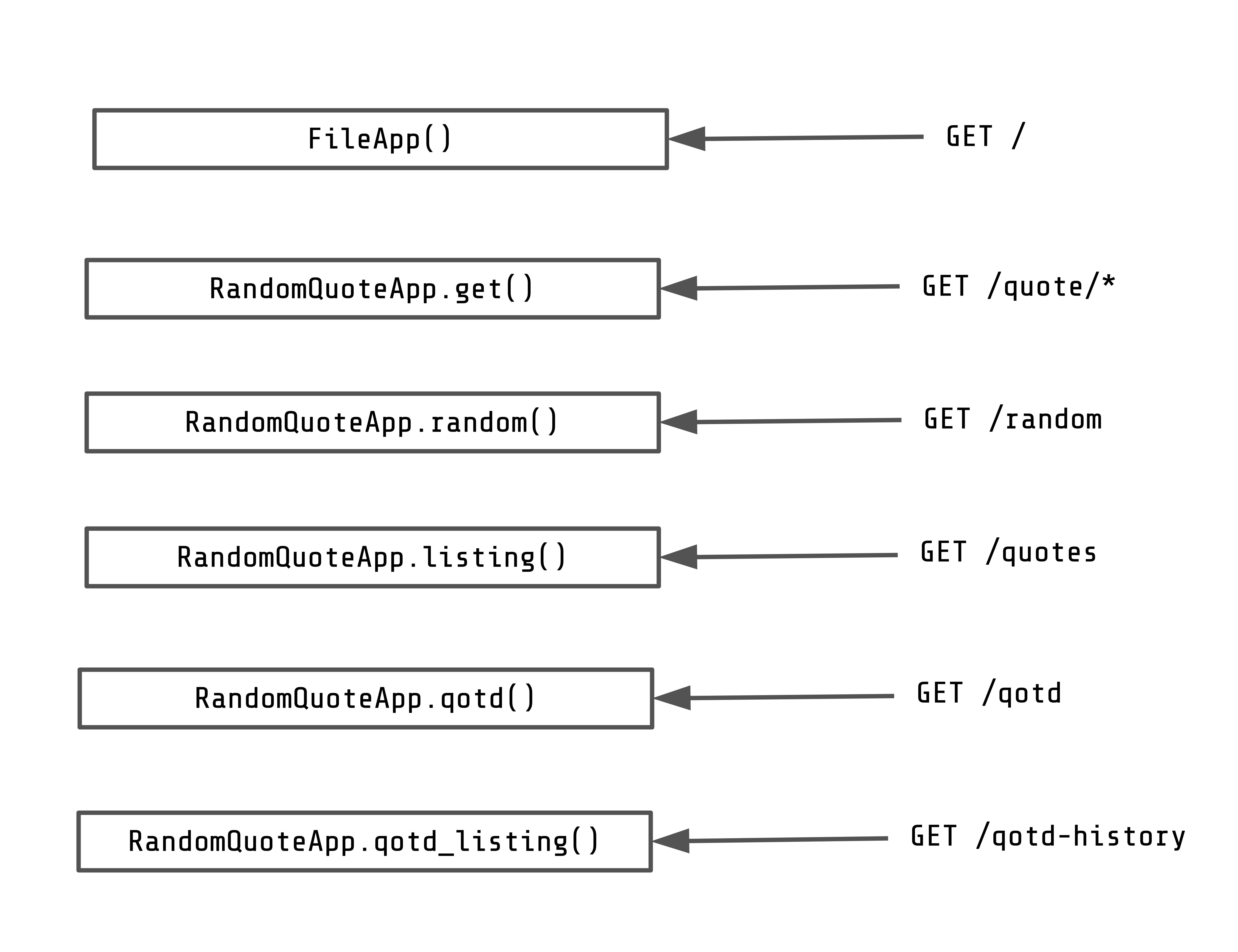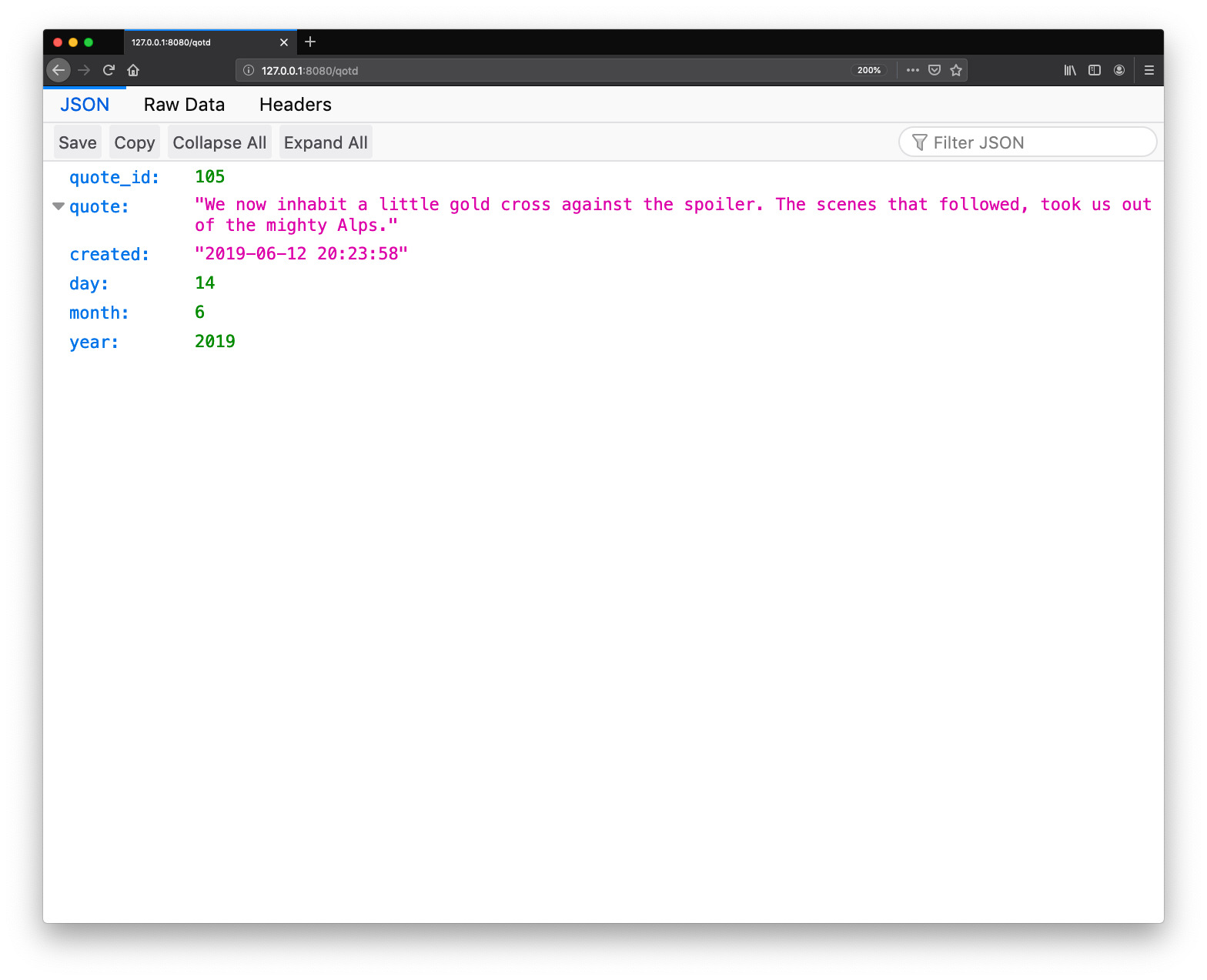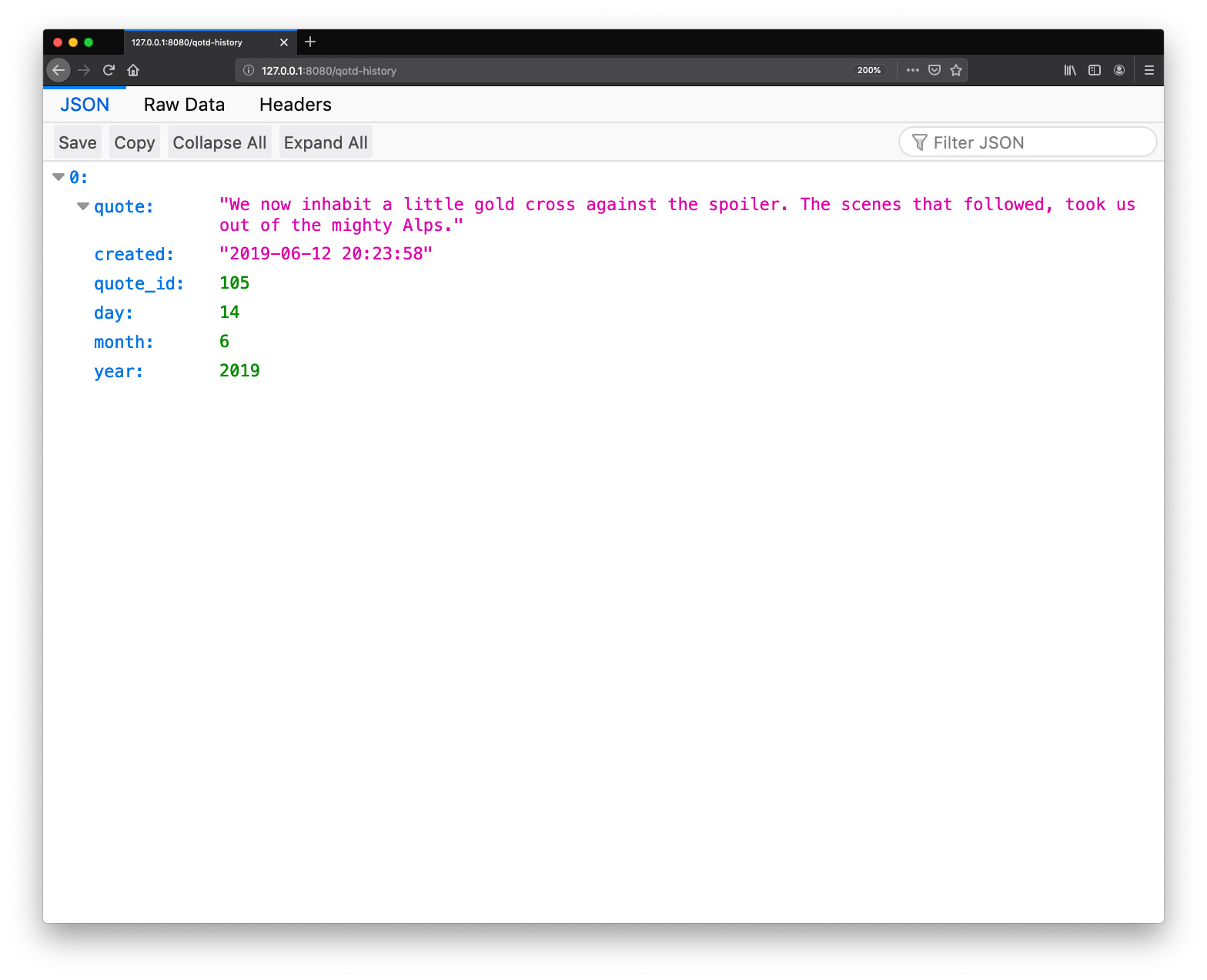This is part three of a three-part series. This is a comprehensive guide to a basic development workflow. Using a simple, but non-trivial web application, we learn how to write tests, fix bugs, and add features using pytest and git, via feature branches. Along the way we'll touch on application design and discuss best practices.
In this installment, we will:
- Simulate collaborative work by two developers.
- Use the workflow we learned in part 2 to add a new feature, and fix a new bug.
- Create a merge conflict and resolve it.
Setup
As with part 2, you will need to make sure you've got everything set up as outlined in part 1, and have merged the changes made in part 2 to master.
Here's a condensed summary:
Ensure you have git, python 3.7+, and venv installed.
Make a bare clone of the base repository to act as our remote:
$ git clone --bare https://github.com/jjmojojjmojo/random_quote.git random_quote_remoteClone our remote:
$ git clone random_quote_remote random_quoteInitialize the virtual environment, and install our requirements and project:
$ cd random_quote $ python -m venv . $ source bin/activate (random_quote) $ pip install -r requirements.txt (random_quote) $ pip install -e .
Initialize the database, add some randomly generated quotes:
(random_quote) $ python scripts/generate_quotes.py (random_quote) $ python >>> from random_quote import util >>> util.init("test.db") util.ingest("quotes.csv", "test.db")
Add the changes from part 1 and part 2. If you had trouble or would like to skip all of that, you can simply checkout the
part2branch
Note that you will have to do this to each clone a and b below.
$ cd ../a $ git checkout part2 $ cd ../b $ git checkout part2Tip
🌈 We have branches for all of the major work done in the series:
part1- All the changes from part 1.
part2- All the changes from part 1 and part 2
qotd- Developer A's feature from part 3.
index-info- Developer B's bug fix from part 3.
part3- All the changes from part 1, part 2 and part 3!
Feel free to
git checkoutif you need to reset your code, or jump around.Use
git stashto keep any uncommitted changes for later. See the git documentation for more information. 🦄
Let's Add A Feature, Fix Another Bug, and Step On Some Toes!
In this part of the guide, we're going to simulate two developers working on different tasks in the same code base.
Developer "A" will be adding a new feature: "Quote of the Day".
This feature has the following requirements:
- Each day, a new random quote is selected, and made available at
/ - The quote is saved, and a list of historical quotes can be seen at
/qotd
Developer "B" will be fixing a bug: "Root is a 404".
This bug is more of an oversight. Remember when we first tested the app, visiting http://127.0.0.1:8080 would return a 404 "Not Found" error. This is not a great practice, even though it's technically true, since there is really no resource located at /. Most people expect to see some sort of information at the root of a website.
So to fix this bug, developer B will be writing up a little info about what HTTP API endpoints are available to be served when a request for / comes in.
The astute reader might notice that these two tasks are in conflict. Both developers are changing what a request for / returns.
This is good for us, because this makes it possible to walk through how to deal with conflicts 😀.
Note
In real life, this situation would have been avoided through basic communication.
The API is something that shouldn't be altered lightly, and so a discussion amongst developers should happen whenever it's going to change.
However, things like this do happen from time to time. 🦄
Before we begin, lets deactivate our virtual environment:
(random_quote) $ deactivate
$
Clone Two Copies Of The Repository
To get started, lets clone two fresh copies of our random_quote_remote bare repository that we made earlier. We'll call them simply a and b so we don't get confused 😎.
Let's make sure we're in the correct directory.
$ cd ..
$ ls
random_quote
random_quote_remote
We can see from the output of ls that our original checkout is present, and the special bare copy we made to use as a remote is there as well.
Next, we'll git clone the remote twice.
Make a copy for developer A:
$ git clone random_quote_remote a
Cloning into 'a'...
done.
And another for developer B:
$ git clone random_quote_remote b
Cloning into 'b'...
done.
Note
If you have opted to skip following part 1 and
part 2, you'll need to git checkout part2 in each repository before proceeding.
Tip
We're going to work on the feature first, then the bug, so things shouldn't be too confusing. Pay attention to the shell prompt in the examples, when the venv virtual environment is active, the prompt changes to the name of the directory. We've carried the prompt changes through to the examples in this guide, so you'll know what clone you're working on:
Developer A:
(a) $
Developer B:
(b) $
Develper A Builds A New Feature: Quote Of The Day
As we discussed when covering the feature requirements, we want our code to have an end point that will always return the "quote of the day" for each 24-hour period. We'd also like to keep a historical record of all the previous quotes that were saved.
There are a few ways to approach this, but there are two sub-features that need to be designed:
- Generating a random quote every day.
- Keeping historical records of past quotes.
First, Lets Branch
In repository a, create a new branch called qotd:
$ cd a
$ git checkout -b qotd
Switched to a new branch 'qotd'
Init
Remember that since this is a fresh clone, we'll need to initialize the virtual environment.
$ python -m venv .
$ source bin/activate
(a) $ pip install -r requirements.txt
(a) $ pip install -e .
Next, copy the database file from your other clone:
(a) $ cp ../random_quote/test.db .
Or initialize a new one:
(random_quote) $ python scripts/generate_quotes.py
(random_quote) $ python
>>> from random_quote import util
>>> util.init("test.db")
util.ingest("quotes.csv", "test.db")
Design: Daily Quotes
Off hand, a few possibilities exist for handling this. 🤔
We could:
- Define a process, that, at midnight each night, uses the
RandomQuoteManagerto select a random quote. This would happen outside of the application or people using it. It could be a manual process, or automated as a scheduled job or task. - Write a function that will pre-generate random quotes for each day of a given time period. This could also be run by a human, or automated to happen on a given interval (once a year, once a month, etc).
- Wait until a quote of the day is requested, generate it on demand and return it, or return the current quote of the day if it's already been generated.
The first two possibilities have advantages when the historical listing of previous quotes of the day is important. There will be a quote for every day, and if users need that, those approaches are more useful. In either case, there will never be a day (unless the process or function doesn't run or cover a particular day) where a quote isn't generated.
On the other hand, generating quotes on demand means that we'll only ever have quotes for days when at least one user requested a quote of the day. The advantage to this is that we never store more data than we need to. The down-side is that we can't count on any given day to have a quote. If our API has a lot of use, it may never be an issue, but there will likely always be holes in the data. As before, it really depends on how the historical quotes are used.
There are other considerations as well. Generating the quote on demand means that the quote generation happens at most once per day (but also at least once per day), whereas the other two options can batch the load of generating quotes. In option 2, we could generate thousands of days of quotes if we wanted to, all at once. In this way, pre-populating the quotes moves the burden of generating a quote away from the process of a user requesting a quote of the day. This keeps the API from becoming less responsive.
Our app is doing simple things, and generating a random quote is a pretty quick process. So the impact on users, even if a special quote of the day was generated for every single one, every day, would be minimal. In other applications, pre-loading is preferred, because the cost of generating the data that's being provided to the user can be higher and can impact their ability to effectively use the application. You don't want the fact that you're generating data on the fly to make your API less responsive.
All that considered, our use case is simple, and our process for making a quote of the day will be lightweight, so we'll opt to generate our quote of the day on the fly, as needed. We'll build the functionality such that it's easy to automate this process later if generating a quote becomes more expensive, thus getting the best of both worlds.
Tip
One other thing we can do that might help is use the HTTP caching headers to tell clients that they only need to make a new request to the quote of the day endpoint once per day.
This is out of scope for this guide, but something to always consider when building web applications. 🌈
Design: Past Quotes Of The Day
The other aspect of this feature is keeping old quotes around after the day they're generated.
Since we're already using a relational database, it's a good candidate for storing quotes of the day.
Note
This may seem obvious, but it's another important thing to remember: just because we're already using a certain pattern or method of storing data, it doesn't automatically make it the best pattern or method. 😎
We can add a new table, called quote_of_the_day to store each generated quote. We'll query that database table and use SQL to return the right quote for the current day.
Tip
We are building a rudimentary cache here. This pattern is extremely useful in application development, especially web development.
Here's our updated ER diagram:
The new quote_of_the_day table consists of four columns:
quote_id, an integer, the ID of the quote that was selected. We'll put a foreign key constraint on theidcolumn in thequotestable
The other three columns will encode the day, month and year:
day, integer, the day of the month (1-31)month, integer, the month (1-12)year, integer, the year (e.g. 2019)
We'll put a unique constraint on these three columns - this prevents anyone from inserting a second quote of the day for any given month/day/year.
By using three columns, we have a few benefits:
Integers are (usually) stored in a form that takes up less space/memory.
We can easily get all the quotes for a given month, or year by just using a
WHEREclause1 2
-- Get all quote id's from March of 2025 SELECT quote_id FROM qote_of_the_day WHERE month=3, year=2025
There's no need to worry about the time portion of the typical date-time storage format (ISO8601, Julian, Unix). This means we don't have to be concerned with timezones, or what happens when a locale difference makes a given time occur on a different calendar day.
The SQL needed to generate the new table looks like this:
1 2 3 4 5 6 7 8 | CREATE TABLE IF NOT EXISTS quote_of_the_day (
quote_id INTEGER NOT NULL,
day INTEGER NOT NULL,
month INTEGER NOT NULL,
year INTEGER NOT NULL,
FOREIGN KEY(quote_id) REFERENCES quotes(id)
UNIQUE(day, month, year)
);
|
Design: API Endpoints
Our new feature will require two new endpoints:
- a GET request to
/will show the quote of the day (and create it if it's not present), as a single JSON object. - a GET request to
/qotdwill return a JSON list of quote objects that were previously generated.
Implementation: Quote Of The Day API
We'll opt to create a new psuedo-manager class, called QuoteOfTheDay. It will be responsible for retrieving a quote for a given day. It will retrieve an existing quote if one is present, generate a new one and save it if not. The default will be the current day, but it will be possible to create or retrieve a quote for any day in the same manner.
For convenience, we'll add an instance of QuoteOfTheDay to RandomQuoteManager, as the qotd property.
Before we start, we need to add the new table to our test.db file. First, add the following to src/random_quote/schema.sql:
11 12 13 14 15 16 17 18 | CREATE TABLE IF NOT EXISTS quote_of_the_day (
quote_id INTEGER NOT NULL,
day INTEGER NOT NULL,
month INTEGER NOT NULL,
year INTEGER NOT NULL,
FOREIGN KEY(quote_id) REFERENCES quotes(id)
UNIQUE(day, month, year)
);
|
Next we'll use our util.init() function, as we did when originally setting up the database:
(a) $ python
>>> from random_quote.util import init
>>> init("test.db")
>>> quit()
Note
We can re-run init() as often as we like because of the IF NOT EXISTS clause in CREATE TABLE and CREATE INDEX. Otherwise, we'd have to either DROP the old tables/index first, or run each CREATE statement separately.
Now we can add the code for our QuoteOfTheDay class. We'll place this in a new src/random_quote/qotd.py module.
Here's the code you need to add.
1 2 3 4 5 6 7 8 9 10 11 12 13 14 15 16 17 18 19 20 21 22 23 24 25 26 27 28 29 30 31 32 33 34 35 36 37 38 39 40 41 42 43 44 45 46 47 48 49 50 51 52 53 54 55 56 57 58 59 60 61 62 63 64 65 66 67 68 69 70 71 72 73 74 75 76 77 78 79 80 81 82 83 84 85 86 87 88 89 90 91 92 93 94 95 96 97 98 99 100 101 102 103 104 105 106 107 108 109 110 111 112 113 114 | """
Generate a random quote of the day.
"""
import sqlite3
import datetime
from . import util
class QuoteOfTheDay:
def __init__(self, db_filename, manager=None):
if manager is None:
from .manager import RandomQuoteManager
self.manager = RandomQuoteManager(db_filename)
else:
self.manager = manager
self.conn = util.connection(db_filename)
def _date_parts(self, date=None):
"""
Helper method to convert a date to the day/month/year that is
stored in the database.
"""
if date is None:
date = datetime.datetime.now()
return (date.day, date.month, date.year)
def get(self, date=None):
"""
Return the quote of the day for a given date, or the current date
if one isn't specified.
If no quote exists for that date, one is generated and saved.
"""
day, month, year = self._date_parts(date)
c = self.conn.cursor()
c.execute("""
SELECT quotes.quote,
quotes.created,
qotd.quote_id,
qotd.day,
qotd.month,
qotd.year
FROM quotes, quote_of_the_day as qotd
WHERE quotes.id = qotd.quote_id
AND day=?
AND month=?
AND year=?
""",
(day, month, year))
result = c.fetchone()
if result is None:
return self.add(date)
else:
return dict(result)
def add(self, date=None):
"""
Add a quote of the day for a given date, or the current date
if one isn't specified.
"""
day, month, year = self._date_parts(date)
quote = self.manager.random()
c = self.conn.cursor()
c.execute("""
INSERT INTO quote_of_the_day
(quote_id, day, month, year)
VALUES (?, ?, ?, ?)
""",
(quote["id"], day, month, year))
self.conn.commit()
return {
'quote_id': quote['id'],
'quote': quote['quote'],
'created': quote['created'],
'day': day,
'month': month,
'year': year
}
def all(self):
"""
Retrieve all existing quotes of the day.
"""
c = self.conn.cursor()
c.execute("""
SELECT quotes.quote,
quotes.created,
qotd.quote_id,
qotd.day,
qotd.month,
qotd.year
FROM quotes, quote_of_the_day as qotd
WHERE quotes.id = qotd.quote_id
ORDER BY qotd.year, qotd.month, qotd.day
""")
result = []
for row in c.fetchall():
result.append(dict(row))
return result
|
Explanation
We implement QuoteOfTheDay as a class.
The constructor, __init__() take two parameters. The first, like RandomQuoteManager and RandomQuoteApp is the path to the sqlite database file.
The second parameter is an optional RandomQuoteManager instance. If one is provided, it is used as-is. However, if that parameter is omitted, a new instance is created using the passed-in database file.
RandomQuoteManager will have a corresponding optional QuoteOfTheDay instance, so the constructor uses a conditional import to prevent issues with a never-ending import cycle. If random_quote.manager imports random_quote.qotd and random_quote.qotd imports random_quote.manager in their module scope, it creates a sort of infinite loop of imports.
We use this RandomQuoteManager instance to get a random quote in the add() method.
In both cases, the corresponding instance is used to provide an extended API. This is a simplistic form of dependency injection, allowing the user to configure their RandomQuoteManager to their liking before passing it, or providing a completely different kind of object that implements the same interface.
The rest of the module should be fairly self-explanatory.
One important thing to note is that the get() method automatically calls add() in the event that no quote of the day is found for the given date.
We'll also need to add an import to src/random_quote/__init__.py, so we can access QuoteOfTheDay from the random_quote.qotd module:
1 2 3 4 | from . import manager
from . import wsgi
from . import util
from . import qotd
|
Next we'll add the qotd property to RandomQuoteManager via it's constructor, in src/random_quote/manager.py:
1 2 3 4 5 6 7 8 9 10 11 12 13 14 15 16 17 18 19 20 21 | """
API code for dealing with the quote database.
"""
import datetime
import random
from . import util
from .qotd import QuoteOfTheDay
RAND_MIN = -9223372036854775808
RAND_MAX = 9223372036854775807
class RandomQuoteManager:
def __init__(self, db_filename, qotd=None):
self.conn = util.connection(db_filename)
if qotd is None:
self.qotd = QuoteOfTheDay(db_filename, self)
else:
self.qotd = qotd
...
|
Explanation
This change allows for API extension and dependency injection that is similar to (and complements) the implementation of QuoteOfTheDay.__init__().
It's a good idea to make a commit after this work is done. This should be second nature by now, but lets walk through the steps, since we're doing something new: adding an untracked file.
(a) $ git status
On branch qotd
Changes not staged for commit:
(use "git add <file>..." to update what will be committed)
(use "git checkout -- <file>..." to discard changes in working directory)
modified: src/random_quote/__init__.py
modified: src/random_quote/schema.sql
modified: src/random_quote/manager.py
Untracked files:
(use "git add <file>..." to include in what will be committed)
src/random_quote/qotd.py
test.db
no changes added to commit (use "git add" and/or "git commit -a")
Note that we now have a file we care about in the Untracked files section, src/random_quote/qotd.py.
We have to git add it in order to get it into our commit:
(a) $ git add src/random_quote/qotd.py
Now, git status shows src/random_quote/qotd.py as a new file:
(a) $ git status
On branch qotd
Changes to be committed:
(use "git reset HEAD <file>..." to unstage)
new file: src/random_quote/qotd.py
Changes not staged for commit:
(use "git add <file>..." to update what will be committed)
(use "git checkout -- <file>..." to discard changes in working directory)
modified: src/random_quote/__init__.py
modified: src/random_quote/manager.py
modified: src/random_quote/schema.sql
Untracked files:
(use "git add <file>..." to include in what will be committed)
test.db
Now git commit:
(a) $ git commit -a -m"Added first-pass of quote of the day functionality"
[qotd 53ae911] Added first-pass of quote of the day functionality
4 files changed, 132 insertions(+), 3 deletions(-)
create mode 100644 src/random_quote/qotd.py
Back-End API Tests
We'll put the main quote of the day tests in src/random_quote/tests/test_qotd.py.
We'll make use of the preconfigured_manager() fixture. This will use fix_random(), and populate the database with some quotes for us.
Then add the tests to src/random_quote/tests/test_qotd.py:
1 2 3 4 5 6 7 8 9 10 11 12 13 14 15 16 17 18 19 20 21 22 23 24 25 26 27 28 29 30 31 32 33 34 35 36 37 38 39 40 41 42 43 44 45 46 47 48 49 50 51 52 53 54 55 56 57 58 59 60 61 62 63 64 65 66 67 68 69 70 71 72 73 74 75 76 77 78 79 80 81 82 83 84 85 86 87 88 89 90 91 92 93 94 95 96 | """
Test the "Quote of the day" functionality.
"""
import pytest
import sqlite3
import datetime
def get_quote_id(conn, day, month, year):
"""
Helper function to get a quote id for the given day/month/year
"""
c = conn.cursor()
c.execute("SELECT quote_id FROM quote_of_the_day WHERE day = ? AND month = ? AND year = ?", (day, month, year))
result = c.fetchone()
return result[0]
def test_add_qotd(preconfigured_manager):
"""
Add a new quote of the day, for the current day.
"""
today = datetime.datetime.now()
quote = preconfigured_manager.qotd.add()
check = get_quote_id(preconfigured_manager.conn, today.day, today.month, today.year)
assert check == quote["quote_id"]
def test_add_qotd_with_date(preconfigured_manager):
"""
Add a new quote of the day, for a given day.
"""
date = datetime.datetime(day=1, year=2025, month=3)
quote = preconfigured_manager.qotd.add(date)
check = get_quote_id(preconfigured_manager.conn, 1, 3, 2025)
assert check == quote["quote_id"]
def test_add_duplicate(preconfigured_manager):
"""
Try to add an additional quote of the day.
"""
date = datetime.datetime(day=1, year=2025, month=3)
preconfigured_manager.qotd.add(date)
with pytest.raises(sqlite3.IntegrityError):
preconfigured_manager.qotd.add(date)
def test_get_without_date(preconfigured_manager):
"""
Get a quote of the day, no date specified. Should create a new QOTD.
"""
today = datetime.datetime.now()
quote = preconfigured_manager.qotd.get()
check = get_quote_id(preconfigured_manager.conn, today.day, today.month, today.year)
assert check == quote["quote_id"]
def test_get_with_date(preconfigured_manager):
"""
Get a quote of the day, for a specified date. Should create a new QOTD.
"""
date = datetime.datetime(day=1, year=2025, month=3)
quote = preconfigured_manager.qotd.get(date)
check = get_quote_id(preconfigured_manager.conn, 1, 3, 2025)
assert check == quote["quote_id"]
def test_all(preconfigured_manager):
"""
Add and retrieve several quotes of the day.
"""
date1 = datetime.datetime(day=1, year=2025, month=3)
date2 = datetime.timedelta(days=1) + date1
date3 = datetime.timedelta(days=1) + date2
quote1 = preconfigured_manager.qotd.add(date1)
quote2 = preconfigured_manager.qotd.add(date2)
quote3 = preconfigured_manager.qotd.add(date3)
result = preconfigured_manager.qotd.all()
assert result[0] == quote1
assert result[1] == quote2
assert result[2] == quote3
|
Explanation
This test suite is fairly self-explanatory.
The common theme with the test cases is that each test uses the current date or a specific date to identify if a quote is being stored. The get_quote_id() helper function assists with this.
Essentially, we're running each test, and then checking the database to see if the expected record was inserted.
Lets also add a new test case to src/random_quote/tests/test_manager.py to make sure that the qotd property exists:
75 76 77 78 79 80 81 | def test_qotd(preconfigured_manager):
"""
Ensure the qotd property exists.
"""
from random_quote.qotd import QuoteOfTheDay
assert isinstance(preconfigured_manager.qotd, QuoteOfTheDay)
|
Run the tests:
(a) $ pytest src
============================== test session starts ==============================
platform darwin -- Python 3.7.3, pytest-4.6.2, py-1.8.0, pluggy-0.12.0
rootdir: [...]/a
collected 17 items
src/random_quote/tests/test_manager.py ....... [ 41%]
src/random_quote/tests/test_qotd.py ...... [ 76%]
src/random_quote/tests/test_wsgi.py .... [100%]
=========================== 17 passed in 0.20 seconds ===========================
Now, git add the src/random_quote/tests/test_qotd.py file, and commit.
Implementation: Web API Endpoints
Here's the updated path map:
To implement the quote of the day functionality in RandomQuoteApp, we'll add the methods qotd() and qotd_listing() which will return the current quote of the day, or all quotes of the day, respectively:
93 94 95 96 97 98 99 100 101 102 103 104 105 106 107 108 109 110 111 112 113 | def qotd(self, request):
"""
Return today's quote of the day.
"""
response = Response()
response.json = self.manager.qotd.get()
response.content_type = "application/json"
return response
def qotd_listing(self, request):
"""
List all existing quotes of the day.
"""
response = Response()
response.json = self.manager.qotd.all()
response.content_type = "application/json"
return response
|
Then we need to update the routing, in __call__():
25 26 27 28 29 30 31 32 33 34 35 36 37 | try:
if request.path == "/":
response = self.qotd(request)
elif request.path == "/qotd":
response = self.qotd_listing(request)
elif request.path == "/quotes":
response = self.listing(request)
elif request.path.startswith("/quote"):
response = self.get(request)
elif request.path == "/random":
response = self.random(request)
else:
raise HTTPNotFound()
|
We can run the http server again and try it out in our browser:
(a) $ gunicorn -b 127.0.0.1:8080 -t 9999999 -w 1 --reload wsgi:app
If you look at http://127.0.0.1:8080, you'll notice a quote of the day is returned, instead of a 404:
And loading http://127.0.0.1:8080/qotd returns a list, showing the quote that was just generated:
Tests For The Web API
Now we need to add tests to src/random_quote/tests/test_wsgi.py. First we need to add a necessary import, since we're going to be using some functions from datetime:
1 2 3 4 5 6 | """
Functional tests of the WSGI application.
"""
import pytest
import datetime
|
Then add three new tests to the bottom of the file:
68 69 70 71 72 73 74 75 76 77 78 79 80 81 82 83 84 85 86 87 88 89 90 91 92 93 94 95 96 97 98 99 100 101 102 103 104 105 | def test_get_root(preconfigured_wsgi_app):
"""
Make a GET request for /
"""
response = preconfigured_wsgi_app.get("/")
json_quote = response.json
today = datetime.datetime.now()
quote = preconfigured_wsgi_app.app.manager.qotd.get(today)
assert json_quote == quote
def test_qotd_empty(preconfigured_wsgi_app):
"""
Request the list of quotes of the day at /qotd - no existing quotes
"""
response = preconfigured_wsgi_app.get("/qotd")
quotes = response.json
assert quotes == []
def test_qotd(preconfigured_wsgi_app):
"""
Request the list of quotes of the day at /qotd
"""
today = datetime.datetime.now()
quote1 = preconfigured_wsgi_app.app.manager.qotd.get(today)
quote2 = preconfigured_wsgi_app.app.manager.qotd.get(datetime.datetime(year=2048, month=2, day=26))
response = preconfigured_wsgi_app.get("/qotd")
quotes = response.json
assert len(quotes) == 2
assert quotes[0] == quote1
assert quotes[1] == quote2
|
Tip
To quit gunicorn, type control-C.
Running the tests, we see the new ones have been picked up:
(a) pytest -v src
============================== test session starts ==============================
platform darwin -- Python 3.7.3, pytest-4.6.2, py-1.8.0, pluggy-0.12.0 -- [...]/a/bin/python
cachedir: .pytest_cache
rootdir: [...]/a
collected 20 items
src/random_quote/tests/test_manager.py::test_add_quote PASSED [ 5%]
src/random_quote/tests/test_manager.py::test_get_quote PASSED [ 10%]
src/random_quote/tests/test_manager.py::test_remove_quote PASSED [ 15%]
src/random_quote/tests/test_manager.py::test_all PASSED [ 20%]
src/random_quote/tests/test_manager.py::test_random_quote PASSED [ 25%]
src/random_quote/tests/test_manager.py::test_unknown_id PASSED [ 30%]
src/random_quote/tests/test_manager.py::test_qotd PASSED [ 35%]
src/random_quote/tests/test_qotd.py::test_add_qotd PASSED [ 40%]
src/random_quote/tests/test_qotd.py::test_add_qotd_with_date PASSED [ 45%]
src/random_quote/tests/test_qotd.py::test_add_duplicate PASSED [ 50%]
src/random_quote/tests/test_qotd.py::test_get_without_date PASSED [ 55%]
src/random_quote/tests/test_qotd.py::test_get_with_date PASSED [ 60%]
src/random_quote/tests/test_qotd.py::test_all PASSED [ 65%]
src/random_quote/tests/test_wsgi.py::test_get_quote PASSED [ 70%]
src/random_quote/tests/test_wsgi.py::test_all_quotes PASSED [ 75%]
src/random_quote/tests/test_wsgi.py::test_random_quote PASSED [ 80%]
src/random_quote/tests/test_wsgi.py::test_get_quote_unknown_id PASSED [ 85%]
src/random_quote/tests/test_wsgi.py::test_root PASSED [ 90%]
src/random_quote/tests/test_wsgi.py::test_qotd_empty PASSED [ 95%]
src/random_quote/tests/test_wsgi.py::test_qotd PASSED [100%]
=========================== 20 passed in 0.52 seconds ===========================
Commit your changes.
Version Bump
As we did in part 2, change the version in setup.py. This time, set the version to 0.2.0, since we have a new feature that is backwards-compatible with the 0.1.0 version.
Don't forget to re-install (pip install -e .), re-run the tests (pytest src), and git commit your changes.
Rebase To master
Since we've only done this process once, lets walk through it again.
First we need to git fetch any outstanding remote changes:
(a) $ git fetch origin master
Next, interactive git rebase:
(a) $ git rebase -i master
Be sure to pick the oldest (first) commit, and squash the rest. Don't forget to write a nice log entry when git rebase gives you the chance.
You can try preserving the old commit messages and adding a summary on the first line:
1 2 3 4 5 6 | FEATURE: Quote Of The Day
Added first-pass of quote of the day functionality
Added tests for Quote Of The Day feature
Added HTTP API support for the quote of the day
Set version to 0.2.0
|
Re-run the tests to make sure nothing went wrong (there should be 20 passing tests):
(a) $ pytest src
============================== test session starts ==============================
platform darwin -- Python 3.7.3, pytest-4.6.2, py-1.8.0, pluggy-0.12.0
rootdir: [...]/a
collected 20 items
src/random_quote/tests/test_manager.py ....... [ 35%]
src/random_quote/tests/test_qotd.py ...... [ 65%]
src/random_quote/tests/test_wsgi.py ....... [100%]
=========================== 20 passed in 0.61 seconds ===========================
Checkout And Merge master
First, git checkout the master branch:
(a) $ git checkout master
Switched to branch 'master'
Your branch is up to date with 'origin/master'.
Then git merge to your qotd feature branch:
(a) $ git merge qotd
Updating c2a655e..150ba38
Fast-forward
src/random_quote/__init__.py | 3 +-
src/random_quote/manager.py | 9 ++-
src/random_quote/qotd.py | 114 ++++++++++++++++++++++++++++++++++
src/random_quote/schema.sql | 11 +++-
src/random_quote/tests/conftest.py | 26 +++++++-
src/random_quote/tests/test_manager.py | 10 ++-
src/random_quote/tests/test_qotd.py | 96 ++++++++++++++++++++++++++++
src/random_quote/tests/test_wsgi.py | 42 ++++++++++++-
src/random_quote/wsgi.py | 29 ++++++++-
9 files changed, 332 insertions(+), 8 deletions(-)
create mode 100644 src/random_quote/qotd.py
create mode 100644 src/random_quote/tests/test_qotd.py
Run the tests again (pytest src)
Push
Finally, publish the changes using git push:
(a) $ git push origin master
Enumerating objects: 25, done.
Counting objects: 100% (25/25), done.
Delta compression using up to 8 threads
Compressing objects: 100% (13/13), done.
Writing objects: 100% (14/14), 3.44 KiB | 3.44 MiB/s, done.
Total 14 (delta 6), reused 0 (delta 0)
To [...]/random_quote_remote
c2a655e..150ba38 master -> master
Developer B Fixes A Bug And Deals With a Git Conflict
Now, switch to the b clone. We're going to pretend that developer B is doing their bug-fix concurrently with the feature that developer A just pushed.
First, deactivate the virtual environment:
(a) $ deactivate
$
Then change into the b directory:
$ cd ../b
Initialize, activate, install, run the tests:
$ python -m venv .
$ source bin/activate
(b) $ pip install -r requirements.txt
(b) $ pip install -e .
(b) $ pytest src
============================== test session starts ==============================
platform darwin -- Python 3.7.3, pytest-4.6.2, py-1.8.0, pluggy-0.12.0
rootdir: [...]/b
collected 10 items
src/random_quote/tests/test_manager.py ...... [ 60%]
src/random_quote/tests/test_wsgi.py .... [100%]
=========================== 10 passed in 0.49 seconds ===========================
Note there are only 10 tests. This is because our copy of master is from before developer A did their work.
Next, copy the database file again, from your original random_quote checkout,
(a) $ cp ../random_quote/test.db .
Or re-initialize, if you'd like:
(random_quote) $ python scripts/generate_quotes.py
(random_quote) $ python
>>>
>>> from random_quote import util
>>> util.init("test.db")
util.ingest("quotes.csv", "test.db")
Design
This bug fix is simply just returning something when an HTTP client makes a GET request for /.
We'll add a static HTML file to the source that will provide links to, and useful info about, each of the API endpoints. It will be served when a GET request is made for /.
We'll use the webob.static.FileApp class to serve the file. This handles buffering and streaming properly for us.
Make The Branch
Lets check out and create our branch. We'll call this one index-info:
(b) $ git checkout -b index-info
Switched to a new branch 'index-info'
Fix The Bug
Lets construct a simple HTML5 file that has the information about the API within it. The links will be relative. This allows for flexibility in how we host the API. We'll put it in a special directory within the source.
First, create the new src/random_quote/static directory:
(b) $ mkdir src/random_quote/static
We're using this name because it indicates there are files that need to be served without being processed. We're setting up an entire directory to give us some flexibility in the future. We may want to add some additional static assets (such as images or CSS files) to our API documentation, or build some sort of front-end for the browser. We can switch to using the webob.static.DirectoryApp class and serve the entire directory at once.
Add the following to src/random_quote/static/index.html:
1 2 3 4 5 6 7 8 9 10 11 12 13 14 15 16 17 18 19 20 21 22 | <!DOCTYPE html>
<html>
<head>
<title>Random Quote API</title>
</head>
<meta charset="UTF-8">
<body>
<h1>Random Quote API</h1>
<p>Welcome to the Random Quote API. This API provides random quote functionality via HTTP.</p>
<h2>API Endpoints</h2>
<p><em>All endpoints only work with GET requests. All responses are JSON</em></p>
<dl>
<dt><a href="quote/1">/quote/1</a></dt>
<dd>Retrieve a specific quote by its ID. In this example, we are retrieving quote #1.</dd>
<dt><a href="quotes">/quotes</a></dt>
<dd>Retrieve all quotes.</dd>
<dt><a href="random">/random</a></dt>
<dd>Retrieve a random quote</dd>
</dl>
</body>
</html>
|
Naming this file index.html is a signal to other developers that this file is intended to be the default file served up when the / (or root path) is requested. This is a convention that goes back to the early days of HTTP servers, and is still in use today.
We need a way to figure out where src/random_quote/static lives. When this application is deployed as a python egg, it could be installed anywhere, and gunicorn (or whatever WSGI server we use) could be running, again, anywhere. We need to find an absolute path to the src/random_quote/static directory.
We have an example of how to do this already, in src/random_quote/util.py, in the schema() function:
14 15 16 17 18 | def schema():
"""
Return the location of the SQL schema.
"""
return os.path.join(os.path.dirname(__file__), "schema.sql")
|
Here we use Python's built-in special __file__ variable that returns the path to the currently executing module (more detail). We then use a couple of functions from the os.path module to construct a path in a system-agnostic way.
Note
Python runs on many platforms, and most code you will write is compatible with all of them. It's best practice to construct paths using os.path (or pathlib). This abstracts away differences like using forward slashes (/, unix-like systems) and backward slashes (\, windows), making it easy to switch platforms or run code in different developer environments.
We can do the same thing with our new static directory. But since we may be using it to serve multiple files, we'll add a little extra functionality to request a more specific path if needed. We'll call the function static(). Add the following to the end of src/random_quote/util.py:
58 59 60 61 62 63 64 65 66 67 | def static(path=None):
"""
Return the full path to a file the static directory.
"""
static = os.path.join(os.path.dirname(__file__), "static")
if path:
return os.path.join(static, path)
else:
return static
|
If we don't pass a path argument, we get the path to just the static directory, otherwise, the path is added to the end.
Tip
We're adding this flexibility because it's likely we'll want to serve other static files, like images, CSS, javascript, etc.
Next, we need to add an import for webob.static.FileApp, and our new util.static() function, to src/random_quote/wsgi.py:
1 2 3 4 5 6 7 8 9 10 11 12 | """
WSGI Applications
"""
from . import manager
from . import util
from webob import Request, Response
from webob.exc import HTTPError, HTTPNotFound, HTTPMethodNotAllowed, HTTPBadRequest
from webob.static import FileApp
import re
class RandomQuoteApp:
...
|
And alter the routing:
27 28 29 30 31 32 33 34 35 36 37 38 39 40 41 | try:
if request.path == "/":
response = FileApp(util.static("index.html"))
elif request.path == "/quotes":
response = self.listing(request)
elif request.path.startswith("/quote"):
response = self.get(request)
elif request.path == "/random":
response = self.random(request)
else:
raise HTTPNotFound()
return response(environ, start_response)
except HTTPError as error_response:
return error_response(environ, start_response)
|
Lets start up the web server, and take a quick look:
(b) $ gunicorn -b 127.0.0.1:8080 -t 9999999 -w 1 --reload wsgi:app
If we visit http://127.0.0.1:8080 in a browser, we will see the new landing page. We can click the links and they should work.
Committing our changes is just like we've done before. Be sure to git add the src/random_quote/static/index.html file.
Tip
Git is a bit odd about how it looks at files and directories. You may notice that running git status lists the src/random_quote/static directory, but not index.html specifically.
You can go ahead and git add the src/random_quote/static directory if you want. Just be aware that git add will add any files it finds in that directory or its subdirectories.
Test For The New Index Page
The test for this fix is pretty simplistic. We just need to make sure there isn't a 404 status returned when making a GET request for /. We can use TestApp to do this, via the preconfigured_wsgi_app() fixture established in src/random_quote/tests/conftest.py.
We should also make sure we're getting the right kind of content, by checking the Content-Type header. A JSON response (application/json), instead of an HTML one (text/html) would indicate something went wrong.
Add this test to the end of src/random_quote/tests/test_wsgi.py:
67 68 69 70 71 72 | def test_get_root(preconfigured_wsgi_app):
"""
Make a GET request for the root path.
"""
response = preconfigured_wsgi_app.get("/")
assert response.content_type == 'text/html'
|
Tip
We could go further with this, and ensure the links actually work. WebTest's response objects have a click() method that could be used to be a bit more thorough.
We run the tests again to make sure our new case was picked up, and that we didn't break anything else:
(b) $ pytest -v src
============================== test session starts ==============================
platform darwin -- Python 3.7.3, pytest-4.6.2, py-1.8.0, pluggy-0.12.0 -- [...]/b/bin/python
cachedir: .pytest_cache
rootdir: [...]/b
collected 11 items
src/random_quote/tests/test_manager.py::test_add_quote PASSED [ 9%]
src/random_quote/tests/test_manager.py::test_get_quote PASSED [ 18%]
src/random_quote/tests/test_manager.py::test_remove_quote PASSED [ 27%]
src/random_quote/tests/test_manager.py::test_all PASSED [ 36%]
src/random_quote/tests/test_manager.py::test_random_quote PASSED [ 45%]
src/random_quote/tests/test_manager.py::test_unknown_id PASSED [ 54%]
src/random_quote/tests/test_wsgi.py::test_get_quote PASSED [ 63%]
src/random_quote/tests/test_wsgi.py::test_all_quotes PASSED [ 72%]
src/random_quote/tests/test_wsgi.py::test_random_quote PASSED [ 81%]
src/random_quote/tests/test_wsgi.py::test_get_quote_unknown_id PASSED [ 90%]
src/random_quote/tests/test_wsgi.py::test_get_root PASSED [100%]
=========================== 11 passed in 0.20 seconds ===========================
Commit the tests.
Version Bump
We've fixed a bug, and so we need to change the version number in setup.py again. This time, it will be 0.1.2:
1 2 3 4 5 6 7 8 9 | from setuptools import setup, find_packages
setup(
name="random_quote",
version="0.1.2",
packages=['random_quote'],
package_dir={'':'src'},
install_requires=['webob'],
include_package_data=True
)
|
Be sure to pip install -e . again and re-run the tests before committing your changes.
Note
You'll notice that our version is now a whole minor revision behind the version we set when adding the "Quote of the day" feature. Remember, in our "b" repository, we're unaware those changes have been made.
Rebase
Lets proceed to do the rebase as usual.
First, we need to git fetch any remote changes we haven't seen yet:
(b) $ git fetch
remote: Enumerating objects: 29, done.
remote: Counting objects: 100% (29/29), done.
remote: Compressing objects: 100% (16/16), done.
remote: Total 17 (delta 8), reused 0 (delta 0)
Unpacking objects: 100% (17/17), done.
From [...]/random_quote_remote
c2a655e..9057fd0 master -> origin/master
Unlike the last couple of times we called git fetch, we actually have changes to download. This is evidenced by the output above.
When we run git rebase -i master, it works as usual. Be sure to run the tests again (there should still only be 11 tests).
Merge, Now With Problems
Now we need to merge master with our local index-info branch.
First, we check out master
(b) $ git checkout master
Switched to branch 'master'
Your branch is behind 'origin/master' by 1 commit, and can be fast-forwarded.
(use "git pull" to update your local branch)
Note that git tells us that our branch is behind origin/master by 1 commit, and suggests that we use git pull to update. git pull is like doing a fetch followed by git merge.
Remember, this isn't our branch, all of our changes are still within the index-info branch. We're just doing an update of changes to master, that should merge without incident.
Lets do a git pull:
(b) $ git pull
Updating fa45753..5e45295
Fast-forward
setup.py | 2 +-
src/random_quote/__init__.py | 3 +-
src/random_quote/manager.py | 7 ++-
src/random_quote/qotd.py | 114 +++++++++++++++++++++++++++++++++++++++++++++++
src/random_quote/schema.sql | 11 ++++-
src/random_quote/tests/test_manager.py | 10 ++++-
src/random_quote/tests/test_qotd.py | 96 +++++++++++++++++++++++++++++++++++++++
src/random_quote/tests/test_wsgi.py | 42 ++++++++++++++++-
src/random_quote/wsgi.py | 28 +++++++++++-
9 files changed, 306 insertions(+), 7 deletions(-)
create mode 100644 src/random_quote/qotd.py
create mode 100644 src/random_quote/tests/test_qotd.py
You see we've pulled in the changes made to master while we were working. This doesn't affect our code in our local index-info branch. For that, we need to git merge:
(b) $ git merge index-info
Auto-merging src/random_quote/wsgi.py
CONFLICT (content): Merge conflict in src/random_quote/wsgi.py
Auto-merging src/random_quote/tests/test_wsgi.py
CONFLICT (content): Merge conflict in src/random_quote/tests/test_wsgi.py
Auto-merging setup.py
CONFLICT (content): Merge conflict in setup.py
Automatic merge failed; fix conflicts and then commit the result.
Oh no! We have some conflicts. This means there are areas of files that git couldn't merge. Typically this means files where the changes are diffuse, or specific lines can't be matched up.
It's important to note that the files that are in conflict get marked up to preserve the conflict.
If you look into src/random_quote/tests/test_wsgi.py, you can see what that looks like:
68 69 70 71 72 73 74 75 76 77 78 79 80 81 82 83 84 85 86 87 88 89 90 91 92 93 94 95 96 97 98 99 100 101 102 103 104 105 106 107 108 109 110 111 112 | def test_get_root(preconfigured_wsgi_app):
"""
<<<<<<< HEAD
Make a GET request for /
"""
response = preconfigured_wsgi_app.get("/")
json_quote = response.json
today = datetime.datetime.now()
quote = preconfigured_wsgi_app.app.manager.qotd.get(today)
assert json_quote == quote
def test_qotd_empty(preconfigured_wsgi_app):
"""
Request the list of quotes of the day at /qotd - no existing quotes
"""
response = preconfigured_wsgi_app.get("/qotd")
quotes = response.json
assert quotes == []
def test_qotd(preconfigured_wsgi_app):
"""
Request the list of quotes of the day at /qotd
"""
today = datetime.datetime.now()
quote1 = preconfigured_wsgi_app.app.manager.qotd.get(today)
quote2 = preconfigured_wsgi_app.app.manager.qotd.get(datetime.datetime(year=2048, month=2, day=26))
response = preconfigured_wsgi_app.get("/qotd")
quotes = response.json
assert len(quotes) == 2
assert quotes[0] == quote1
assert quotes[1] == quote2
=======
Make a GET request for the root path.
"""
response = preconfigured_wsgi_app.get("/")
assert response.content_type == 'text/html'
>>>>>>> index-info
|
Now git status shows the conflicting files:
(b) git status
On branch master
Your branch is up to date with 'origin/master'.
You have unmerged paths.
(fix conflicts and run "git commit")
(use "git merge --abort" to abort the merge)
Changes to be committed:
new file: src/random_quote/static/index.html
modified: src/random_quote/util.py
Unmerged paths:
(use "git add <file>..." to mark resolution)
both modified: setup.py
both modified: src/random_quote/tests/test_wsgi.py
both modified: src/random_quote/wsgi.py
Untracked files:
(use "git add <file>..." to include in what will be committed)
test.db
Taking a look at the the other two files in question, we see that the primary issue arises because we're doing two different actions when an HTTP client makes a GET request for /, as you might expect. It's important to note the reason for the conflict is that the specific lines that changed are in conflict, not the overall changes.
The secondary issue is that we have conflicting version numbers in setup.py:
src/random_quote/wsgi.py:
setup.py:
Before we can resolve these conflicts, we need to make a decision about the right thing to do when a GET request is made for /, and what the correct version number should be.
The "Quote Of The Day" feature added a quote of the day at /. Our "API Index Information" bug fix added documentation at the same location.
Note
This is not a conversation that should happen in a vacuum. This is a major API change, and as we mentioned before, ideally it would have been settled before the two developers even started working.
Communication is key to avoid these conflicts, and it's the only way to get past them when they manage to get through.
The first thing you should always do when a merge conflict happens is reach out to the other developer and make sure you're all on the same page.
Thinking about it objectively, it's probably best to keep the documentation at /. That's the most useful for our users.
Now, we need to figure out how one would request a quote of the day, if something else is being returned at /.
The Quote Of The Day feature put the listing of all quotes of the day on /qotd, but that endpoint is probably better suited for returning today's quote of the day.
So, now we just need a way to present all quotes of the day, so lets move that to /qotd-history.
Here's an updated path map to show how things route:
Next, we need to decide which version number to use. In this case, we should consider the end result of our merge.
Developer B's version is 0.1.2, and developer A's is 0.2.0.
What we'll do is do the next bug fix version (or patch version) of the API update (or minor version), which gives us 0.2.1.
Note
This has the advantage of also preserving any tags that were made for the two versions. We skipped that step here for the sake of brevity, but having three tags, one for 0.1.2, 0.2.0 and 0.2.1 means we can deploy any of those three versions independently. This gives us a great deal of flexibility. 🦄
Lets fix setup.py first. We just need to take out the markers (===== and >>>>) and any duplicated lines, leaving only the stuff we need. When you're finished, setup.py will look like this:
1 2 3 4 5 6 7 8 9 | from setuptools import setup, find_packages
setup(
name="random_quote",
version="0.2.1",
packages=['random_quote'],
package_dir={'':'src'},
install_requires=['webob'],
include_package_data=True
)
|
Now lets fix src/random_quote/wsgi.py. The conflict is in __call__(), in the routing.
27 28 29 30 31 32 33 34 35 36 37 38 39 40 41 42 43 | try:
if request.path == "/":
<<<<<<< HEAD
response = self.qotd(request)
elif request.path == "/qotd":
response = self.qotd_listing(request)
=======
response = FileApp(util.static("index.html"))
>>>>>>> index-info
elif request.path == "/quotes":
response = self.listing(request)
elif request.path.startswith("/quote"):
response = self.get(request)
elif request.path == "/random":
response = self.random(request)
else:
raise HTTPNotFound()
|
To fix this, we need to preserve the case when the request looks for /, but also add the new paths we discussed above.
27 28 29 30 31 32 33 34 35 36 37 38 39 40 41 42 43 44 45 | try:
if request.path == "/":
response = FileApp(util.static("index.html"))
elif request.path == "/qotd":
response = self.qotd(request)
elif request.path == "/qotd-history":
response = self.qotd_listing(request)
elif request.path == "/quotes":
response = self.listing(request)
elif request.path.startswith("/quote"):
response = self.get(request)
elif request.path == "/random":
response = self.random(request)
else:
raise HTTPNotFound()
return response(environ, start_response)
except HTTPError as error_response:
return error_response(environ, start_response)
|
Tip
You can use a diff tool to fix merge conflicts in an interactive way.
Check out git mergetool for details.
Before we can do a manual test, we need to add the changes to the database schema. This is done using util.init(), run from the interpreter:
(b) $ python
Python 3.7.3 (default, Mar 30 2019, 03:37:43)
[Clang 10.0.0 (clang-1000.11.45.5)] on darwin
Type "help", "copyright", "credits" or "license" for more information.
>>>
>>> from random_quote.util import init
>>> init("test.db")
Now we can start up gunicorn again:
(b) $ gunicorn -b 127.0.0.1:8080 -t 9999999 -w 1 --reload wsgi:app
And open http://127.0.0.1:8080,
And http://127.0.0.1:8080/qotd-history
The next conflict is in one of the test files, src/random_quote/tests/test_wsgi.py. Lets fix that next.
The only conflict is near the bottom, where the 'qotd' tests step on the 'index-info' tests. We can fix this by moving some code around and changing the requested paths:
68 69 70 71 72 73 74 75 76 77 78 79 80 81 82 83 84 85 86 87 88 89 90 91 92 93 94 95 96 97 98 99 100 101 102 103 104 105 106 107 108 109 110 111 112 113 114 115 116 117 118 119 120 121 122 123 124 125 126 127 128 129 130 131 132 133 134 135 136 137 138 139 140 141 142 143 144 145 146 147 148 149 150 151 152 153 154 155 156 157 | def test_get_root(preconfigured_wsgi_app):
"""
Make a GET request for the root path.
"""
response = preconfigured_wsgi_app.get("/")
assert response.content_type == 'text/html'
def test_qotd_empty(preconfigured_wsgi_app):
"""
Request the list of quotes of the day at /qotd-history - no existing quotes
"""
response = preconfigured_wsgi_app.get("/qotd-history")
quotes = response.json
assert quotes == []
def test_qotd_listing(preconfigured_wsgi_app):
"""
Request the list of quotes of the day at /qotd-history
"""
today = datetime.datetime.now()
quote1 = preconfigured_wsgi_app.app.manager.qotd.get(today)
quote2 = preconfigured_wsgi_app.app.manager.qotd.get(datetime.datetime(year=2048, month=2, day=26))
response = preconfigured_wsgi_app.get("/qotd-history")
quotes = response.json
assert len(quotes) == 2
assert quotes[0] == quote1
assert quotes[1] == quote2
def test_qotd(preconfigured_wsgi_app):
"""
Retrieve the current quote of the day
"""
response = preconfigured_wsgi_app.get("/qotd")
json_quote = response.json
today = datetime.datetime.now()
quote = preconfigured_wsgi_app.app.manager.qotd.get(today)
assert json_quote == quote
def test_get_root(preconfigured_wsgi_app):
"""
Make a GET request for the root path.
"""
response = preconfigured_wsgi_app.get("/")
assert response.content_type == 'text/html'
def test_qotd_empty(preconfigured_wsgi_app):
"""
Request the list of quotes of the day at /qotd-history - no existing quotes
"""
response = preconfigured_wsgi_app.get("/qotd-history")
quotes = response.json
assert quotes == []
def test_qotd_listing(preconfigured_wsgi_app):
"""
Request the list of quotes of the day at /qotd-history
"""
today = datetime.datetime.now()
quote1 = preconfigured_wsgi_app.app.manager.qotd.get(today)
quote2 = preconfigured_wsgi_app.app.manager.qotd.get(datetime.datetime(year=2048, month=2, day=26))
response = preconfigured_wsgi_app.get("/qotd-history")
quotes = response.json
assert len(quotes) == 2
assert quotes[0] == quote1
assert quotes[1] == quote2
def test_qotd(preconfigured_wsgi_app):
"""
Retrieve the current quote of the day
"""
response = preconfigured_wsgi_app.get("/qotd")
json_quote = response.json
today = datetime.datetime.now()
quote = preconfigured_wsgi_app.app.manager.qotd.get(today)
assert json_quote == quote
|
Now we can run the tests to make sure everything still works:
(b) $ pytest src
================================ test session starts =================================
platform darwin -- Python 3.7.3, pytest-4.6.3, py-1.8.0, pluggy-0.12.0
rootdir: [...]/b
collected 21 items
src/random_quote/tests/test_manager.py ....... [ 33%]
src/random_quote/tests/test_qotd.py ...... [ 61%]
src/random_quote/tests/test_wsgi.py ........ [100%]
============================= 21 passed in 0.36 seconds ==============================
Before we proceed, we have one last thing to do: we need to update the web API documentation at / to reflect the new API endpoints that we added as part of resolving the conflicts.
Documentation Update
Add the following links to src/random_quote/static/index.html:
20 21 22 23 | <dt><a href="qotd">/qotd</a></dt>
<dd>Retrieve today's "Quote of the day."</dd>
<dt><a href="qotd-history">/qotd-history</a></dt>
<dd>Retrieve all previous "Quote of the day." entries.</dd>
|
Start up gunicorn again:
(b) $ gunicorn -b 127.0.0.1:8080 -t 9999999 -w 1 --reload wsgi:app
If we open http://127.0.0.1:8080 in a browser, the new page is shown, and the links do what they're supposed to.
Complete the merge
Now that we've untangled this mess, we need to finish up the merge.
git status reminds us that we're in the middle of merging:
(b) $ git status
On branch master
Your branch is up to date with 'origin/master'.
You have unmerged paths.
(fix conflicts and run "git commit")
(use "git merge --abort" to abort the merge)
Changes to be committed:
new file: src/random_quote/static/index.html
modified: src/random_quote/util.py
Unmerged paths:
(use "git add <file>..." to mark resolution)
both modified: setup.py
both modified: src/random_quote/tests/test_wsgi.py
both modified: src/random_quote/wsgi.py
Changes not staged for commit:
(use "git add <file>..." to update what will be committed)
(use "git checkout -- <file>..." to discard changes in working directory)
modified: src/random_quote/static/index.html
Untracked files:
(use "git add <file>..." to include in what will be committed)
test.db
To finish the merge, we first need to let git know the conflicted files are fixed. We do this by using git add:
(b) $ git add src/random_quote/tests/test_wsgi.py
(b) $ git add src/random_quote/wsgi.py
(b) $ git add setup.py
Now git status tells us what we need to do next:
(b) $ git status
On branch master
Your branch is up to date with 'origin/master'.
All conflicts fixed but you are still merging.
(use "git commit" to conclude merge)
Changes to be committed:
modified: setup.py
new file: src/random_quote/static/index.html
modified: src/random_quote/tests/test_wsgi.py
modified: src/random_quote/util.py
modified: src/random_quote/wsgi.py
Changes not staged for commit:
(use "git add <file>..." to update what will be committed)
(use "git checkout -- <file>..." to discard changes in working directory)
modified: src/random_quote/static/index.html
Untracked files:
(use "git add <file>..." to include in what will be committed)
test.db
To complete the merge, we just need to do what git status is telling us: git commit:
(b) $ git commit -a -m"Resolved API endpoint conflicts"
[master 36c0796] Resolved API endpoint conflicts
Now we can git push our changes to the remote:
(b) $ git push origin master
Enumerating objects: 37, done.
Counting objects: 100% (36/36), done.
Delta compression using up to 8 threads
Compressing objects: 100% (18/18), done.
Writing objects: 100% (23/23), 2.59 KiB | 2.59 MiB/s, done.
Total 23 (delta 12), reused 0 (delta 0)
To [...]/random_quote_remote
9057fd0..5ccabd1 master -> master
Tag The Fixed Version
As a last step, we just need to git tag our new version, and push it to the remote:
(b) $ git tag v0.2.1
(b) $ git push origin v0.2.1
Total 0 (delta 0), reused 0 (delta 0)
To [...]/random_quote_remote
* [new tag] v0.2.1 -> v0.2.1
Conclusion
In this final section, we covered resolving merge conflicts.
Now, you should be well-versed in working with git branches and using pytest to ensure you don't break things. 🦄
If you have any ideas, problems, or suggestions, don't hesitate to contact the author.
Resources, What To Do If You Messed Up
Feel free to contact the author if you have any problems with this guide.
Check out http://sethrobertson.github.io/GitFixUm/fixup.html for a nice general git troubleshooting guide! It's extremely well done.
